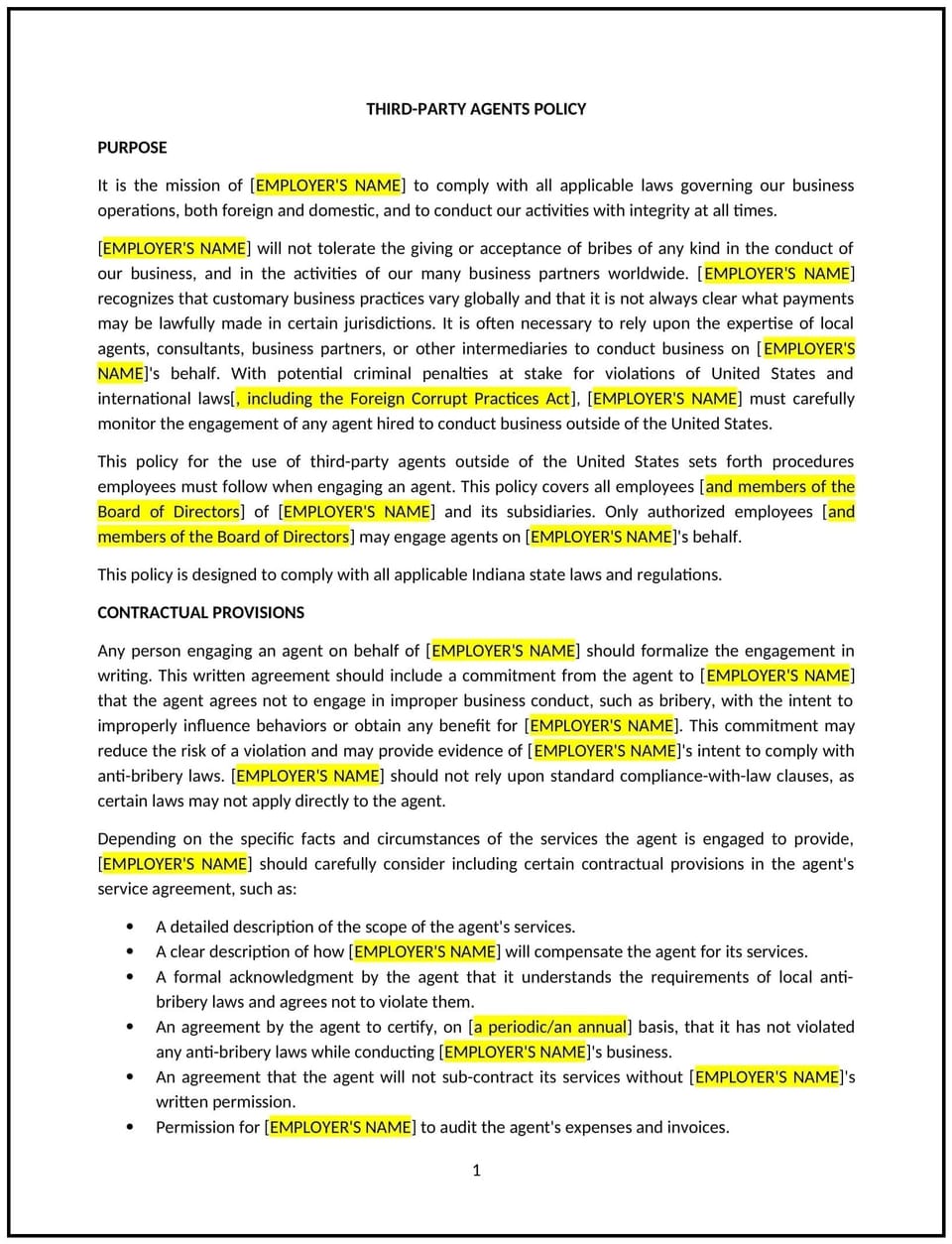Third-party agents policy (Indiana): Free template

Third-party agents policy (Indiana): Free template
This third-party agents policy helps Indiana businesses establish clear guidelines for managing relationships with third-party agents, such as contractors, consultants, or vendors. It outlines expectations, responsibilities, and procedures to ensure that third-party agents act in alignment with the business's values, legal obligations, and operational goals. The policy also provides a framework for evaluating, monitoring, and terminating third-party agreements when necessary.
By implementing this policy, Indiana businesses can mitigate risks, ensure accountability, and foster productive partnerships with third-party agents.
How to use this third-party agents policy (Indiana)
- Define third-party agents: Clearly outline who qualifies as a third-party agent, such as contractors, consultants, vendors, or other external service providers engaged to support business operations.
- Establish selection criteria: Specify the standards for selecting third-party agents, including qualifications, reputation, and alignment with the business’s objectives and compliance requirements.
- Outline onboarding procedures: Provide steps for onboarding third-party agents, including signing agreements, providing necessary documentation, and completing any required training.
- Specify roles and responsibilities: Clearly define the roles and responsibilities of both the business and the third-party agent to ensure alignment and mutual understanding.
- Address compliance requirements: Include guidelines for ensuring that third-party agents adhere to applicable laws, industry regulations, and company policies, such as data protection or safety protocols.
- Monitor performance: Establish procedures for regularly reviewing the performance of third-party agents to ensure they meet agreed-upon standards and deliverables.
- Include termination processes: Provide guidelines for terminating agreements with third-party agents, including conditions for termination and the steps to follow.
- Review and update regularly: Periodically assess the policy to reflect changes in business practices, legal requirements, or market conditions.
Benefits of using this third-party agents policy (Indiana)
Implementing this policy provides several key benefits for Indiana businesses:
- Enhances accountability: Clearly defines expectations and responsibilities for third-party agents, ensuring they deliver on commitments.
- Mitigates risks: Reduces potential liabilities by requiring third-party agents to adhere to legal and contractual obligations.
- Supports operational consistency: Establishes a framework for selecting, onboarding, and managing third-party agents, improving efficiency.
- Promotes compliance: Helps businesses align with Indiana laws and regulations related to third-party relationships.
- Improves performance oversight: Provides mechanisms for monitoring and evaluating the performance of third-party agents.
- Simplifies dispute resolution: Outlines clear procedures for addressing issues or terminating agreements with underperforming agents.
Tips for using this third-party agents policy (Indiana)
- Communicate expectations: Share the policy with all relevant employees and third-party agents to ensure mutual understanding of roles and responsibilities.
- Perform due diligence: Conduct thorough background checks and assessments before engaging any third-party agent to verify their qualifications and reputation.
- Monitor compliance: Regularly review third-party agents’ adherence to company policies and applicable regulations, addressing any discrepancies promptly.
- Maintain clear documentation: Ensure that all agreements, communications, and performance reviews with third-party agents are documented and securely stored.
- Foster open communication: Encourage regular check-ins and feedback to maintain a strong working relationship with third-party agents.
- Plan for contingencies: Include provisions in agreements to address unexpected issues, such as performance failures or changes in project scope.
Q: Who qualifies as a third-party agent under this policy?
A: Third-party agents include contractors, consultants, vendors, and other external service providers engaged to perform tasks or services on behalf of the business.
Q: What criteria should businesses use to select third-party agents?
A: Businesses should evaluate third-party agents based on qualifications, reputation, past performance, and alignment with the company’s goals and compliance requirements.
Q: How can businesses monitor third-party agents’ performance?
A: Businesses can conduct regular performance reviews, track deliverables, and hold periodic check-ins to ensure third-party agents meet expectations.
Q: What should businesses include in third-party agreements?
A: Agreements should outline roles, responsibilities, deliverables, timelines, payment terms, compliance requirements, and conditions for termination.
Q: How should businesses handle non-compliance by third-party agents?
A: Businesses should address non-compliance by discussing the issue with the agent, providing a timeline for corrective action, and, if necessary, terminating the agreement.
Q: Are businesses responsible for training third-party agents?
A: While not always required, businesses may provide training on specific company policies or procedures to ensure third-party agents can perform their roles effectively.
Q: When should businesses terminate a third-party agreement?
A: Agreements should be terminated if the agent fails to meet performance expectations, violates compliance requirements, or if their services are no longer needed.
Q: How often should the third-party agents policy be reviewed?
A: The policy should be reviewed annually or whenever there are changes to legal requirements, business operations, or market conditions.
This article contains general legal information and does not contain legal advice. Cobrief is not a law firm or a substitute for an attorney or law firm. The law is complex and changes often. For legal advice, please ask a lawyer.


